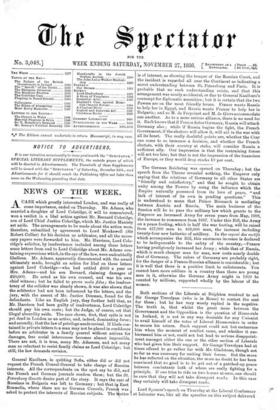NEWS OF THE WEEK.
ACASE which greatly interested London, and was really of some importance, ended on Thursday. Mr. Adams, who married a daughter of Lord Coleridge, it will be remembered, won a verdict in a libel action against Mr. Bernard Coleridge, son of Lord Chief Justice Coleridge, which Mr. Justice Manisty set aside. The arrangements to be made about the action were, therefore, submitted by agreement to Lord Monkswell (Sir Robert Collier) for his decision as arbitrator, and all the neces- sary papers were forwarded to him. Mr. Harrison, Lord Cole- ridge's solicitor, by inadvertence included among these letters some letters from and to Lord Coleridge about Mr. Adams con- taining expressions which,in the eye of the law, were undoubtedly libellous. Mr. Adams, apparently discontented with the award ultimately made, brought an action for libel on these letters against Lord Coleridge—who had settled 2600 a year on Mrs. Adams—and his son Bernard, claiming damages of £20,000. He acted as his own counsel, and was his own chief witness ; but he failed to prove mala fides; the inadver- tency of the solicitor was clearly shown, it was also shown that the arbitrator had not been influenced by the letters, and the jury, with the assent of Mr. Justice Denman, found for the defendants. Like an English jury, they further held that, as Mr. Harrison had been guilty of inadvertence, Lord Coleridge ehonld pay his own costs ; but the Judge, of course, set that illegal absurdity aside. The case shows, first, that spite is not yet dead in London as an active, and, indeed, dominating force ; and secondly, that the law of privilege needs revisal. If libels con- tained in private letters to a man may not be placed in confidence before an arbitrator in a family quarrel without actions for damages, free social intercourse becomes almost impossible. There are not, it is true, many Mr. Adamses, and not many men as reluctant to resist family claims as Lord Coleridge; but still, the law demands revision.






































